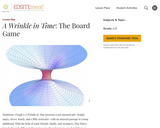
A handout/tutorial on the correct use of quotations in one's writing.
- Subject:
- English Language Arts
- Material Type:
- Reading
- Provider:
- University of Chapel Hill North Carolina Writing Center
- Author:
- UNC Writing Center
- Date Added:
- 02/26/2019

A handout/tutorial on the correct use of quotations in one's writing.

This resource contains a collection of worksheets and activities on the proper use of was and were.

Frederick Douglass, a freed slave, is asked to give a speech to a group of Americans on the 4th of July. Douglass uses the occasion to eloquently and forcefully address the hypocrisy of a nation celebrating freedom, while enslaving so many. With equal force, he strips bare the arguments for slavery, concluding with a call for radical action to end slavery in America. In this CCSS lesson, students will explore this history with text dependent questions, academic vocabulary, and writing assignments.

The narrator of The White Umbrella is a Chinese American girl who struggles with feelings of embarrassment and longing to be like others. In this CCSS lesson, students will explore this story through text dependent questions, academic vocabulary, and writing assignments.

Brian Aldiss describes a futuristic world in which machines are capable of thinking based on the tasks they have been designed to perform. One day the machines realize that the few remaining humans have died, leaving the machines to fend for themselves. In this CCSS lesson, students will explore this story with text dependent questions, academic vocabulary, and writing assignments.

Diane Ackerman describes fall foliage and explains the natural processes that cause the leaves of deciduous trees to turn each year. Along with her observations, she also muses on the significance of the changing of seasons and on life and death. In this CCSS lesson, students will explore this story with text dependent questions, academic vocabulary, and writing assignments.

“The Wreck of the Hesperus†is a narrative poem about an arrogant ship captain (skipper) who takes his daughter on an ill-fated voyage across a wintry sea. In this CCSS lesson, students will explore this poem through text dependent questions, academic vocabulary, and writing assignments.

This lesson invites students to reconfigure Meg’s journey into a board game where, as in the novel itself, Meg’s progress is either thwarted or advanced by aspects of her emotional responses to situations, her changing sense of self, and her physical and intellectual experiences.

In this lesson, students identify and analyze folktales. They learn the characteristics of folktales and use them to evaluate existing tales and to create original tales of their own. Students apply the writing process to strengthen writing skills and to develop creativity.